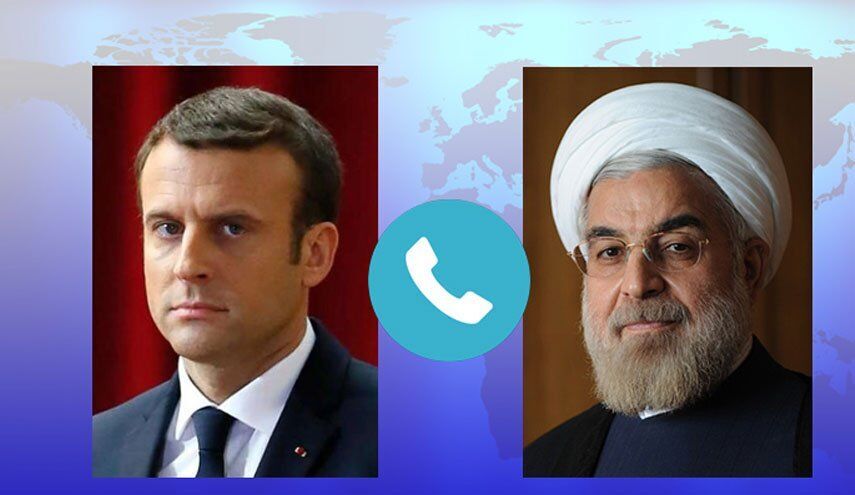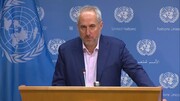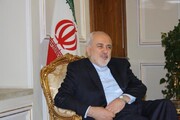The anniversary of the withdrawal of the US from the nuclear deal was the beginning of a review by Tehran of commitment to the JCPOA; an obligation that has been unilaterally executed so far, and the other sides have failed to implement it in any way, as subject discussed in the telephone call between President Hassan Rouhani with his French counterpart Emmanuel Macron on June 25.
During the conversation, the president emphasized that "under no circumstances we will negotiate for an agreement reached after two years of talks".
President Rouhani also noted the reason for Iran's adherence to the JCPOA after the US withdrawal the promise by European parties to secure economic benefits, including resolving issues related to banking relations and the sale of oil and highlighted that unfortunately, none of them was realized. If Iran cannot take advantage of the JCPOA, it will reduce its obligations under articles 26 and 36.
From the first day of the anniversary of the withdrawal of the United States on May 8, Tehran put aside its strategic patience in this regard, and took reciprocal action and, of course, taken into account the increasing uranium and heavy water reserves, as well as setting a two-month deadline for Europeans to perform such obligations.
On Monday, June 17, Atomic Energy Organization of Iran (AEOI) spokeswoman Behrooz Kamalvandi said during a media visit to the Arak heavy water complex in a warning to the members of the JCPOA, "Today, a countdown begins to run for 300 kilos of reserved enriched uranium, and for up to 10 days as of June 27, we will cross this ceiling.”
The International Atomic Energy Agency (IAEA)’s recent report also highlighted Iran's rising reserves, suggesting Tehran was serious in its decision vis-a-vis the JCPOA. Ali Shemkhani, secretary of the Supreme National Security Council, also announced that since July 7, the second step of reducing Iran's obligations under Articles 26 and 36 will be seriously launched.
In parts of the note issued by the secretary of the Supreme National Security Council, the European commitments have been seriously questioned; commitments that remain only on paper and the European Troika committed itself only at political level.
Recently, representatives of Britain, France and Germany issued a statement after the session of the Security Council, while expressing concern at the recent tensions in the region, emphasized on their commitment to maintaining and fully implementing Security Council resolution 2231.
Of course, following Tehran's step-by-step measures to reduce its commitment in the JCPOA, in recent weeks we have been witnessing the struggle of the European authorities, including the holding of a joint commission of the JCPOA. In addition to the German Foreign Minister's Heiku Maas visit to Tehran on Monday, June 10, and his visit with President Hassan Rouhani, there is now some news of the diplomatic struggle of the union leaders.
Recently, Reuters reported an imminent trip by foreign ministers to three of the European Union members of the JCPOA ; a trip that is said to be a new plan for rescuing the JCPOA that may encourage the authorities of the Islamic Republic, about their mechanisms for full implementation of the nuclear deal.
The change in the British approach is another illustration of Europe's concern about the Tehran-Washington tensions and Iran's countermeasures in the face of the JCPOA. Following the stance of US President Donald Trump and his accusation of Iran of involvement in the attack on oil tankers in the Oman Sea, British Foreign Secretary Jeremy Hunt clearly announced his support for Trump and said there was "no reason we are to be skeptical of the US assessment about the involvement of the Islamic Republic of Iran in these attacks." During an explosion of ships in the Fujairah port of the UAE he added that he said he would stand by the United States.
But there is now a clear U-turn in British foreign policy and Hunt's remarks. He said Britain was "unlikely to fight alongside America" against Iran in last Tuesday's statement in the British Parliament saying it did not expect the United States to ask the country to join the war with Iran.
Experts believe that, unlike the United States, which believes that pressuring Iran will lead to resume negotiations, Europe has a different look. From the heads of Brussels’ views, the threats and sanctions of the United States, which have now led to Iran's countermeasures in both nuclear issue and other areas, in contrast to the United States, which believes that pressure on Iran will lead to re-negotiation; a critical situation that will spill over into Europe. Hence, they have begun their own struggle to get out of this turbulent situation.
9455**2050
Follow us on Twitter @IrnaEnglish





Your Comment